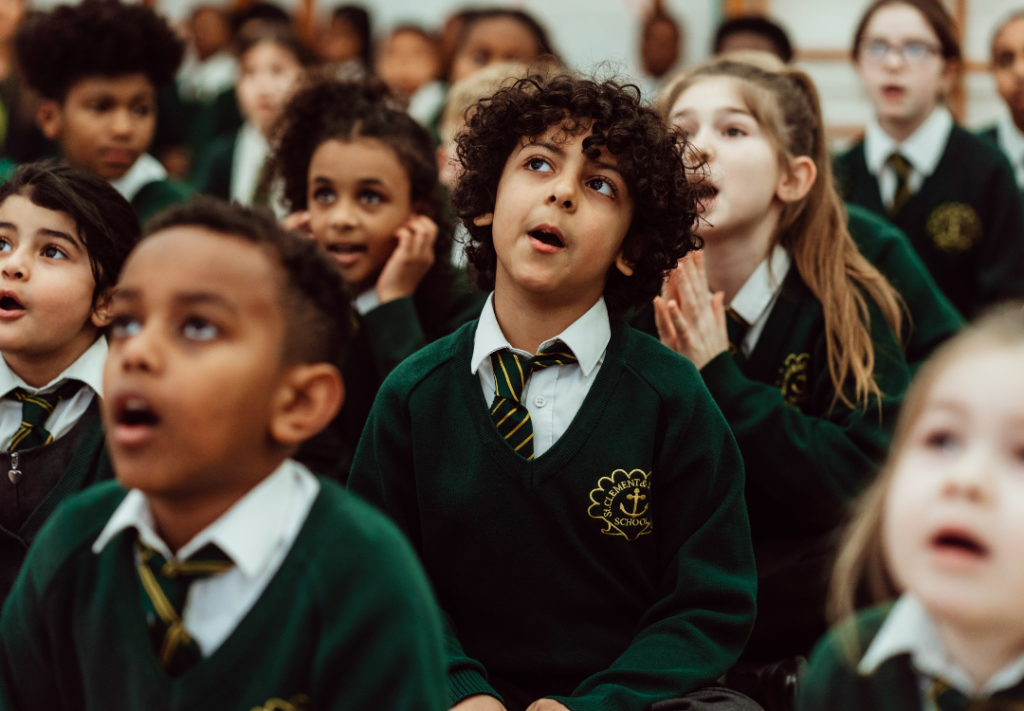
The move from KS1 to KS2 can be a big step for pupils. Ease the transition by giving them a curriculum and learning environment built on personal expression, consistency and progression. Give them Sing Education music!


To everything turn, turn, turn
There is a season turn, turn, turn
And a time to every purpose…
Winter to Spring. Dusk to dawn. Caterpillar to butterfly. Our natural environment is full of moments of transition.
So too with education. And some of the most important are the transitions between key stages.
“The transition [stages] through primary and secondary education [are significant] for children and young people (CYP) and their families.
These times of change can be challenging and anxiety-provoking, particularly when the child and/or young person is vulnerable or has special educational needs and/or a disability that require understanding and support over the transition. As school staff, [we] have an important role to play in shaping the child’s transition experience.” DCC
Let’s look at the four factors which are fundamental to ensuring successful key stage transition.

Academic setting plays an important role in identifying how easy or challenging key stage transitions may be.
“The transition from KS1 to KS2 can be a big step for children. Some face moving from an infants school to a junior or middle school; others remain on the same site but have to get used to a new classroom, building or playground.” TSR
“The balance shifts for pupils in Year 2 as they move to a more formal curriculum in preparation for Year 3 and beyond. But for some children, there’s an extra complication of moving schools, as they transfer from infant to junior school. [Good headteachers are clear about ] how they manage the transition for their pupils – looking at when the process begins, how they help parents adjust, how the learning changes and key elements that make for a smoother journey.“ TES
Let’s take a closer look at Broadmeadow Infants and Junior schools who at one time were facing serious challenges re: their KS1 to KS2 transition.
Some background…
Broadmeadow Infants and Broadmeadow Juniors are two mixed gender, community schools based in the West Midlands (Birmingham). The Junior School is larger than average with 260 pupils. There are high levels of social deprivation in the local area and more than 50% of pupils are eligible for free school meals.
In terms of learning, BJS is organised in mixed ability classes with 20% of students having identified special needs. The school supports these pupils through its pastoral care and SENCO specialists. Parents are also encouraged to participate fully in the life of the school through visits, parents’ evenings and student showcase activities.
So how did students fare transitioning from Year 2 to Year 3 studies?
Not so well.
Prior to recent leadership changes, there had been a history of frosty relations between the Infants and Junior schools, with little communication between the two.
A 12-month project revealed a second, even deeper, schism – the perception of Year 3 teachers that Key Stage 1 SATs results were over-inflated and children were moving into the Junior School with unrealistic levels which led to overambitious targets.
“The school is part of soft federation with the co-located Infant School. However, communication between the two schools has been limited, with both schools working relatively autonomously. Recent history, including the Junior School falling into an OFSTED category (Serious Weaknesses 05-06) due to low value added, had led to a difficult relationship between the two schools particularly in the areas of standardised assessment and transition. While individuals were cordial and professional, relationships remained somewhat distant and there were few opportunities for Collaboration.” BJS


Taking the evidence from the study, Broadmeadow Infants and the Junior School moved quickly into action, making significant amendments to their joint offering.
A new transition unit was put into place, as well as the following academic measures:
Key Stage 1 SATs
The results?
“The inquiry process was a valuable mechanism which supported staff in developing greater understanding of each other’s context. Staff in both schools had previously had limited understanding of the pressures and challenges faced in each other’s settings. The project provided a structure and process which has facilitated a climate of honesty and a willingness to change through open discussion.” BJS
Sing Education is in a very enviable position.
Working over time and within select partner schools, we have the ability to teach ongoing cohorts of pupils – from as young as nursery age, right the way through Year 6.
At Sing Education we teach on the basis of a full-year curriculum.
Based on our method, we can readily set out for schools what their pupils will be learning throughout the academic year and from year to year as they progress with our service. We have a full plan that covers all of those nuances and within that plan sits our comprehensive bank of teaching resources.
By working with our own curriculum structure, resources and knowledge bank, we have been able to accomplish two aims…consistency across time and effective long- and short-term planning.
Another key point is that our curriculum is delivered by specialist teachers. They create a successful music learning environment through our high energy, singing led, child-focused lessons, as well as by demonstrating positive classroom management
Using the Kodály method we ensure subject matter is presented logically and builds on the children’s previous experience with music. This helps students to consolidate earlier learning and link new concepts to previous knowledge.
This means that module upon module, year upon year, Sing Education builds not only musical skills but also trust, consistency and progression – all while encouraging personal expression, peer collaboration and independent action, as well.

Founded in 2014 and serving more than 16,000 children each week, Sing Education is a first class provider of primary school music education. Focusing on high-quality, singing-led tuition, we deliver a complete solution for schools which includes teacher recruitment, training and management, bespoke curricular resources and educational consultancy services.
Through music lessons, singing assemblies, choirs, after school clubs and instrumental tuition, Sing Education works with students from Nursery right through to Year 6. Our core philosophy is that “Every Child Has A Voice,” and, as educators active in the classroom, our directors and teachers know firsthand how much young learners benefit from exciting, rewarding music education.
Sing Education currently partners with schools throughout Greater London and Kent, as well as Yorkshire and the Humber.
Not yet on the list? Please enquire about our expansion plans for additional areas we will serve during the 2023-24 academic year.
#SingEducation #HubsAndSpokes #InsideMusicEd
